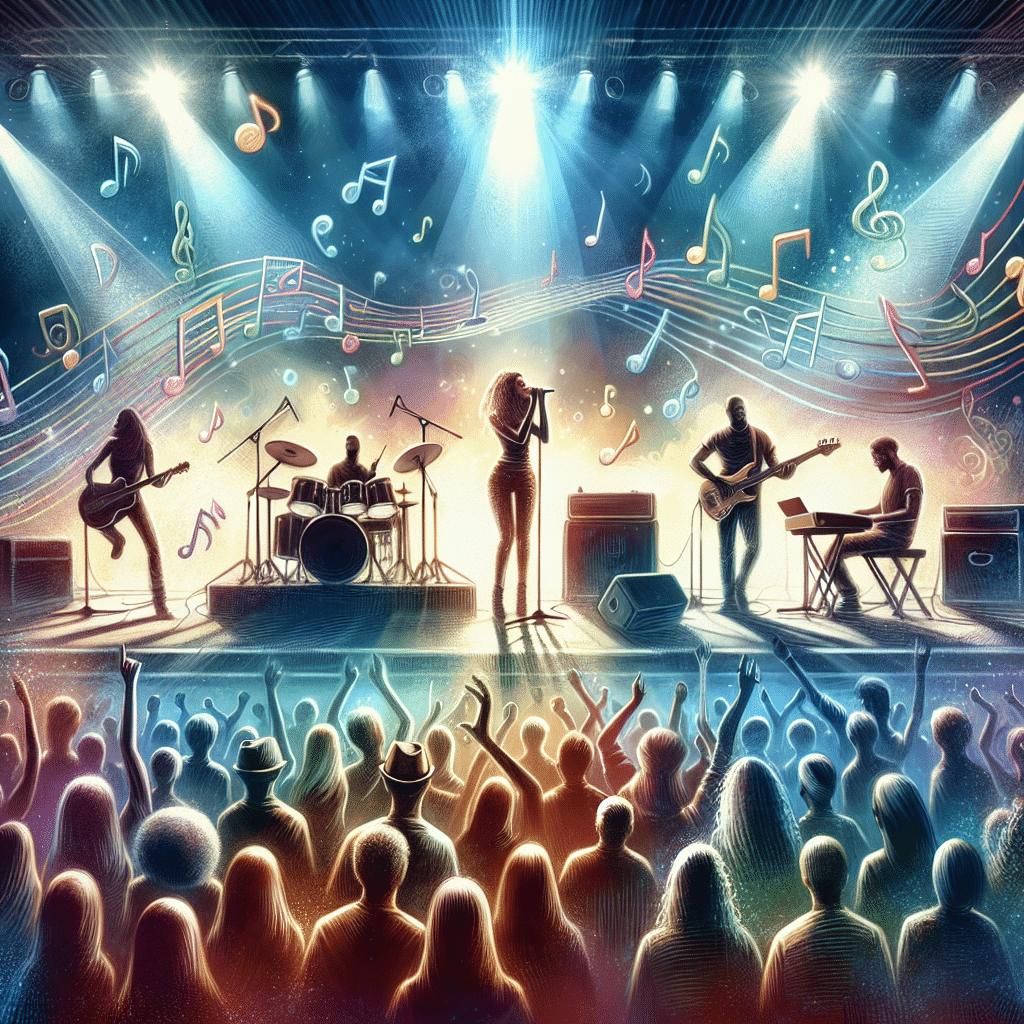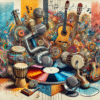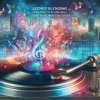New Voices: Emerging Artists Who Are Making Waves in the Pop Scene

Introduction
The global pop music scene is an ever-evolving entity that reflects changing cultural narratives, technological advances, and shifting audience tastes. While mainstream pop has long been dominated by established superstars, the emergence of new voices is reshaping the musical landscape. These emerging artists are not just adding fresh melodies and beats; they are challenging conventions, exploring diverse themes, and redefining what it means to be a pop musician in the 21st century. In this article, we'll discuss the historical context that has led to this moment, highlight key emerging artists making a mark, explore current trends shaping the pop landscape, and reflect on the cultural impact of these new voices.
Historical Context
Pop music has always been a reflection of societal changes. In the 1960s and 70s, artists like The Beatles and Aretha Franklin helped to weave complex social and political themes into a commercially viable format. The 1980s and 90s introduced the blockbuster pop star, from Madonna to Michael Jackson, whose elaborate productions defined mainstream pop. However, the 2000s saw a significant shift with the rise of digital technology and social media, empowering a generation of independent artists to produce and share their music without the traditional constraints of record labels.
Platforms like SoundCloud, Instagram, and TikTok have enabled many creators to gain popularity without the backing of major record companies, democratizing the music industry. This shift has not only enabled diverse voices to flourish but has also shifted the power dynamic in the industry, allowing for the rise of "DIY" musicians who can engage with audiences directly.
See Also: Global Grooves: How World Music Influences the Modern Pop Landscape
Global Grooves: How World Music Influences the Modern Pop LandscapeKey Artists
Olivia Rodrigo
As a teen sensation, Olivia Rodrigo burst onto the pop scene in 2021 with her debut single "drivers license," which shattered streaming records and captivated listeners with its emotional honesty. Her storytelling ability sets her apart, as she channels personal experiences into relatable pop anthems that resonate with a younger audience. Rodrigo's debut album, SOUR, showcases not only her vocal prowess but also her ability to navigate various genres, from pop-punk to ballads.
Doja Cat
Blending genres and breaking down barriers, Doja Cat has taken the pop world by storm with her unique sound and bold aesthetic. Her viral hit "Say So" drew attention for its catchy hook and retro vibe, and her ability to seamlessly incorporate elements of hip-hop, R&B, and pop has earned her a diverse fanbase. Doja's playful yet powerful presence challenges traditional gender roles within the genre, making her an influential figure for future artists.
Sabrina Carpenter
Known for her multifaceted talents as an actress and musician, Sabrina Carpenter has stepped out as a prominent new voice in pop. With her album Emails I Can’t Send, Carpenter delves into themes of love, heartbreak, and self-discovery. Her ability to merge pop sensibility with relatable lyrics has helped her establish a strong connection with fans, reflecting a modern approach to songwriting.
- Rina Sawayama
Rina Sawayama is a trailblazer not simply in pop music but also in her advocacy for inclusivity and representation. Her debut album, SAWAYAMA, garnered critical acclaim for its boldness and genre-blending approach, combining elements of R&B, nu-metal, and pop. Sawayama’s activism for LGBTQ+ representation, particularly as a British-Japanese artist, sets a powerful example for others seeking to push boundaries within the industry.
Current Trends
Several trends currently define the burgeoning landscape of pop music, largely influenced by the emergence of new voices.
1. Genre Blending
Today's emerging artists are often characterized by their willingness to experiment and blend genres. Unlike traditional pop, which adhered closely to specific sound characteristics, modern artists freely mix elements from R&B, electronic, hip-hop, and even country to create their unique soundscapes. This genre fluidity allows for greater expression, increasing accessibility to various demographics.
See Also: The Soundtrack of Our Lives: Pop Songs That Define 2023
The Soundtrack of Our Lives: Pop Songs That Define 20232. Social Media Influence
Platforms like TikTok have revolutionized music promotion, helping songs go viral overnight. Emerging artists are leveraging these platforms to build their brand and reach wider audiences with creative videos that highlight their music. Trends also dictate which songs become hits, leading to a pop landscape that is constantly changing.
3. Authenticity and Vulnerability
A growing trend among new voices is the emphasis on authenticity and vulnerability in songwriting. Emerging artists increasingly draw from personal experiences and emotions, allowing listeners to connect on deeper levels. Lyrics that explore mental health, relationships, and self-identity resonate widely, encouraging dialogue and community building.
Cultural Impact
The impact of emerging artists extends far beyond music charts. They are influencing popular culture, fashion, and discussions surrounding social justice. By representing diverse backgrounds and narratives, these artists provide visibility to communities often underrepresented in mainstream media. Their music reflects contemporary societal issues, allowing them to act as agents of change and sparking important conversations.
See Also: Genre Blending: How Pop is Evolving in 2023 and What It Means for the Future
Genre Blending: How Pop is Evolving in 2023 and What It Means for the FutureMoreover, the rise of these new voices reinforces the idea that success can be achieved on one’s own terms, an empowering message for aspiring musicians. With the traditional gatekeepers of the music industry being less relevant, young artists feel encouraged to explore and express their creativity, leading to a richer pool of talent.
Conclusion
The emergence of new voices in the pop scene marks a transformative era for the genre. Artists like Olivia Rodrigo, Doja Cat, Sabrina Carpenter, and Rina Sawayama challenge conventions and offer perspectives that resonate with contemporary audiences. Through their innovative approaches and authentic storytelling, these artists exemplify the significant shifts occurring within the industry.
As the pop landscape continues to evolve, so too will the narratives, sounds, and cultural impacts associated with emerging artists. This new wave of talent not only enriches the music we listen to but also fosters a greater connection among fans, artists, and societal issues. Truly, these new voices hold the power to shape the future of pop music and culture.
FAQs
Q: How can I discover emerging pop artists?
See Also: Rising Stars: Up-and-Coming Pop Artists You Need to Know
Rising Stars: Up-and-Coming Pop Artists You Need to KnowA: Explore music streaming platforms, social media, and playlists dedicated to new talent. Follow music blogs and attend virtual concerts featuring unsigned or indie artists.
Q: What role does social media play in the success of new artists?
A: Social media allows artists to promote their music, connect with fans, and gain visibility without traditional marketing. Viral trends can significantly boost an artist's visibility.
Q: Are these emerging artists influencing mainstream pop?
A: Yes, many emerging artists are reshaping the mainstream pop sound through their innovative techniques and poignant lyrics. Their influence is evident in the music and marketing strategies of established pop stars.
Q: Can I support emerging artists?
See Also: Breakthrough Stars: Pop Artists Who Are Shaking Up the Charts
Breakthrough Stars: Pop Artists Who Are Shaking Up the ChartsA: You can support emerging artists by streaming their music, buying merchandise, attending their shows, and promoting them on social media. Every action helps amplify their reach.
If you want to know other articles similar to New Voices: Emerging Artists Who Are Making Waves in the Pop Scene you can visit the category Pop.
